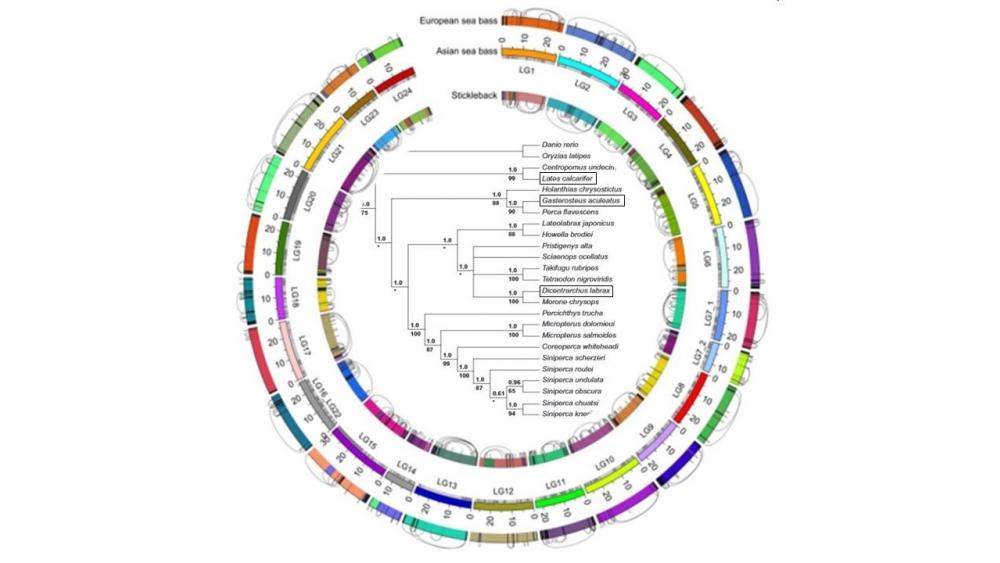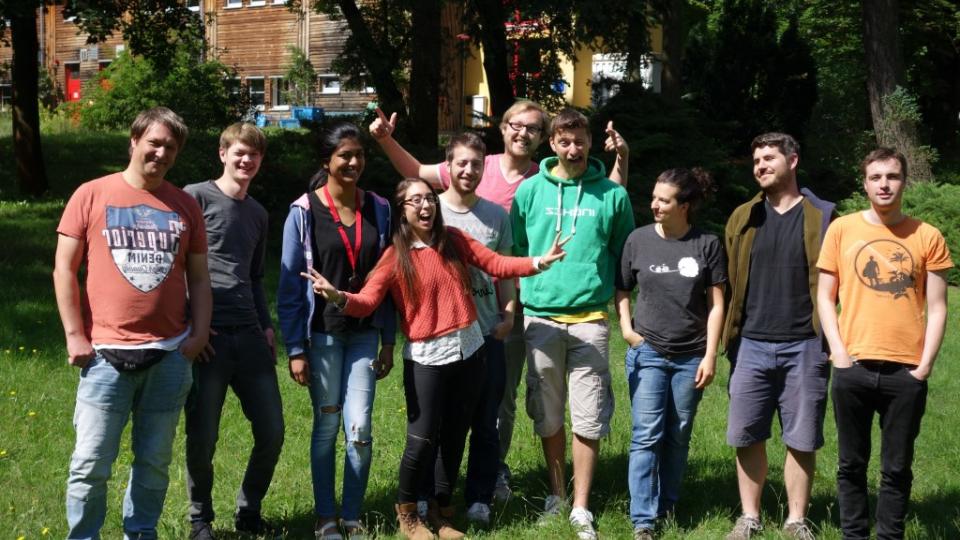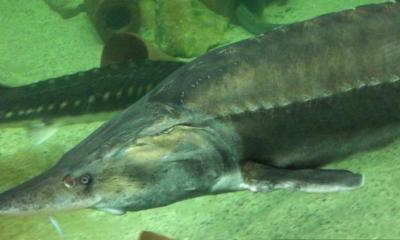
Molecular Fish Physiology

Group profile

Comparative and evolutionary genomics analyses enable improved genome assemblies to support the sustainable development of commercial percid fish species, aiming at improved reproductive management, breeding and feeding technology (DFG). Here: phylogenetic context of two recently published genomes, Lates calcarifer (Asian sea bass) and Dicentrarchus labrax (European sea bass) and their chromosomal relationships. | Image: Heiner Kuhl / IGB
Our research focuses on the physiological mechanisms involved in the regulation of reproduction, nutrition and the immune system as essential basis for the species-appropriate rearing in aquaculture. The molecular mechanisms (including genetics) and the biotic and abiotic interactions provide the incentives for the optimization of current aquaculture practice and thereby support the sustainable development (species-specific needs/animal welfare, technological R&D, diversification) of fish farming. Combining chemical, molecular, histological and bioinformatic methods, we aim at contributing for a better understanding of the biology and diversity of fish. Providing a knowledge base for consumers and experts, we outline important topics in aquaculture on the internet platform Aquakulturinfo.

The team from left to right: Sven, Sahana (guest scientist from Vodnany), Filipa, Carlos, Hendrik, Konrad, Eva, Fabian, Maurice. | Photo: IGB
The arapaima is heavily hunted for its meat and is now threatened by extinction. Establishing the technology to reproduce and grow fish in aquaculture will reduce the fishing pressure and support farming in rural, remote areas of South America. | Photo: Sven Würtz / IGB
Functional feed improve stress resistance and health. Establishing native probiotics in finfish provide thus an alternative to pharmaceutical approaches improving overall aquaculture sustainability. | Photo: Konrad Wanka / IGB
Publications
Publications
2026
January 2026
Sven Wuertz; Eva Kreuz; Jan Hallermann; Jörn Gessner; Thomas Rossoll; Vanessa Bremerich; Constancia Levertz; Tobias Goldhammer
2025
January 2026
Christian Wolter; Sascha Starck; Sven Würtz; Udo Rothe
Die Oder: Ein Flusssystem zwei Jahre nach der Umweltkatastrophe vom August 2022
Naturmagazin Berlin, Brandenburg. - 39(2025)1, S. 10-13
December 2025
Paolo Gamberoni; Jay Tering; Matthew James Slater; Sven Wuertz; Mirko Bögner
Effects of chronic nitrate stress on Litopenaeus vannamei reared in indoor aquaculture systems
Aquaculture international. - 33(2025), Art. 714
August 2025
Margie Glenn; Sascha Behrens; Jens C. Nejstgaard; Sven Wuertz; Joern Gessner
Hemolytic toxicity of Prymnesium parvum (B-type) reveals species-specific differences in freshwater fishes
Ecotoxicology and Environmental Safety. - 303(2025), Art. 118928
March 2025
Paolo Gamberoni; Sven Wuertz; David Bierbach; Mirko Bögner; Matthew James Slater
European perspectives on Litopenaeus vannamei aquaculture: An expert’s survey
Aquaculture Reports. - 42(2025), Art. 102732
January 2025
Sven Wuertz; Florian Muehlbauer
Aquaculture Development in Myanmar: Aquaculture Quo Vadis?
Water. - 17(2025)3, Art. 397
2024
December 2024
Sven Wuertz; Amien Isaac Amoutchi; Johnny Ogunji
Diversification of Aquaculture in the Sub-Saharan Region—The Obscure Snakehead
Fishes. - 9(2024)12, Art. 526
December 2024
Johnny Ogunji; Onyedikachi Evulobi; Stanley Iheanacho; Sven Wuertz
November 2024
Alessandra Escurra-Alegre; Fritz A. Francisco; Fabian Schäfer; Sven Wuertz; Werner Kloas; David Bierbach
September 2024
Heiner Kuhl; Jürgen F. H. Strassert; Dora Čertnerová; Elisabeth Varga; Eva Kreuz; Dunja K. Lamatsch; Sven Wuertz; Jan Köhler; Michael T. Monaghan; Matthias Stöck
The haplotype-resolved Prymnesium parvum (type B) microalga genome reveals the genetic basis of its fish-killing toxins
Current Biology. - 34(2024)16, 3698-3706.e4
June 2024
Heiner Kuhl; Peter T. Euclide; Christophe Klopp; Cédric Cabau; Margot Zahm; Céline Lopez‑Roques; Carole Iampietro; Claire Kuchly; Cécile Donnadieu; Romain Feron; Hugues Parrinello; Charles Poncet; Lydia Jaffrelo; Carole Confolent; Ming Wen; Amaury Herpin; Elodie Jouanno; Anastasia Bestin; Pierrick Haffray; Romain Morvezen; Taina Rocha de Almeida; Thomas Lecocq; Bérénice Schaerlinger; Dominique Chardard; Daniel Żarski; Wesley A. Larson; John H. Postlethwait; Serik Timirkhanov; Werner Kloas; Sven Wuertz; Matthias Stöck; Yann Guiguenh
January 2024
Herausgeber: Leibniz-Institut für Gewässerökologie und Binnenfischerei (IGB) im Forschungsverbund Berlin e.V.. Autor*innen: Stella Berger, Jörn Gessner, Jan Köhler, Karla Münzner, Jens Nejstgaard, Martin Pusch, Matthias Stöck, Christian Wolter, Sven Würtz. Redaktion: Julia Walter. Gestaltung: Angelina Tittmann
2023
February 2024
Herausgeber: Leibniz-Institut für Gewässerökologie und Binnenfischerei (IGB) im Forschungsverbund Berlin e.V.. Autor*innen: Christian Wolter, Sven Würtz, Jan Köhler und Martin Pusch. Redaktion: Julia Walter und Angelina Tittmann
[IGB Fact Sheet] Zentrale Zwischenergebnisse zum Zustand der Oder nach der Umweltkatastrophe
December 2023
Johnny Ogunji; Sven Wuertz
September 2023
Sven Wuertz; Carsten Schulz; Simon Klatt; Wibke Kleiner; Jan P. Schroeder
Adverse effects of ozonation on the animal welfare of tilapia Oreochromis niloticus in recirculation aquaculture
Aquaculture Reports. - 32(2023), Art. 101737
July 2023
Sven Wuertz; David Bierbach; Mirko Bögner
Welfare of Decapod Crustaceans with Special Emphasis on Stress Physiology
Aquaculture Research. - XX(2023)X, Art. 1307684
June 2023
Sven Wuertz; Axel Orban; Fabian Johannes Schaefer; Julia Lynne Overton; Angela Krüger
April 2023
Sven Wuertz; Filipa Beça; Eva Kreuz; Konrad M. Wanka; Rita Azered; Marina Machado; Benjamin Costas
August 2022
Sven Wuertz; Stefan Reiser
Creatine: a valuable supplement in aquafeeds?
Reviews in Aquaculture. - 15(2023)1, 292-304
2022
September 2022
Sven Wuertz; Cem Hinrich Pahl; Werner Kloas
2021
November 2021
Mateus C. Adolfi; Kang Du; Susanne Kneitz; Cédric Cabau; Margot Zahm; Christophe Klopp; Romain Feron; Rômulo V. Paixão; Eduardo S. Varela; Fernanda L. de Almeida; Marcos A. de Oliveira; Rafael H. Nóbrega; Céline Lopez-Roques; Carole Iampietro; Jérôme Lluch; Werner Kloas; Sven Wuertz; Fabian Schaefer; Matthias Stöck; Yann Guiguen; Manfred Schartl
A duplicated copy of id2b is an unusual sex-determining candidate gene on the Y chromosome of arapaima (Arapaima gigas)
Scientific Reports. - 11(2021), Art. 21544
July 2021
Heiner Kuhl; Yann Guiguen; Christin Höhne; Eva Kreuz; Kang Du; Christophe Klopp; Céline Lopez-Roques; Elena Santidrian Yebra-Pimentel; Mitica Ciorpac; Jörn Gessner; Daniela Holostenco; Wibke Kleiner; Klaus Kohlmann; Dunja K. Lamatsch; Dmitry Prokopov; Anastasia Bestin; Emmanuel Bonpunt; Bastien Debeuf; Pierrick Haffray; Romain Morvezen; Pierre Patrice; Radu Suciu; Ron Dirks; Sven Wuertz; Werner Kloas; Manfred Schartl; Matthias Stöck
A 180 Myr-old female-specific genome region in sturgeon reveals the oldest known vertebrate sex determining system with undifferentiated sex chromosomes
Philosophical Transactions of the Royal Society of London : Ser. B, Biological Sciences. - 376(2021)1832, 20200089
June 2021
Christin Höhne; Dmitry Prokopov; Heiner Kuhl; Kang Du; Christophe Klopp; Sven Wuertz; Vladimir Trifonov; Matthias Stöck
The immune system of sturgeons and paddlefish (Acipenseriformes): a review with new data from a chromosome-scale sturgeon genome
Reviews in Aquaculture. - 13(2021)3, 1709-1729
May 2021
by Sven Wuertz; Arne Schroeder; Konrad M. Wanka
Probiotics in fish nutrition - Long-standing household remedy or native nutraceuticals?
Water. - 13(2021)10, Art. 1348
2020
August 2020
Elena Santidrián Yebra-Pimentel; Bruno Reis; Jörn Gessner; Sven Wuertz; Ron P. H. Dirks
Temperature training improves transcriptional homeostasis after heat shock in juvenile Atlantic sturgeon (Acipenser oxyrinchus)
Fish Physiology and Biochemistry. - 46(2020)5, S. 1653-1664
August 2020
Shan He; Ling LI; Li-Yuan Lv; Wen-Jing Cai; Ya-Qi Dou; Jiao Li; Shu-Lin Tang; Xu Chen; Zhen Zhang; Jing Xu; Yan-Peng Zhang; Zhan Yin; Sven Wuertz; Ya-Xiong Tao; Heiner Kuhl; Xu-Fang Liang
Mandarin fish (Sinipercidae) genomes provide insights into innate predatory feeding
Communications Biology. - 3(2020)art. 361
June 2020
Kang Du; Matthias Stöck; Susanne Kneitz; Christophe Klopp; Joost M. Woltering; Mateus Contar Adolfi; Romain Feron; Dmitry Prokopov; Alexey Makunin; Ilya Kichigin; Cornelia Schmidt; Petra Fischer; Heiner Kuhl; Sven Wuertz; Jörn Gessner; Werner Kloas; Cédric Cabau; Carole Iampietro; Hugues Parrinello; Chad Tomlinson; Laurent Journot; John H. Postlethwait; Ingo Braasch; Vladimir Trifonov; Wesley C. Warren; Axel Meyer; Yann Guiguen; Manfred Schartl
The sterlet sturgeon genome sequence and the mechanisms of segmental rediploidization
Nature Ecology & Evolution. - 4(2020)6, S. 841-852
May 2020
Heiner Kuhl; Ling Li; Sven Wuertz; Matthias Stöck; Xu-Fang Liang; Christophe Klopp
CSA: a high-throughput chromosome-scale assembly pipeline for vertebrate genomes
GigaScience. - 9(2020)5, giaa034
2019
January 2020
Sven Wuertz; Hilal Güralp; Martin Psenicka; Mikhail Chebanov
Sex determination in sturgeon
Sex control in aquaculture / ed. by Han-Ping Wang ... - Hoboken : Wiley, 2019. - Vol. 2, ch. 33, S. 645-668
August 2019
Maria Cámara Ruiz; Carlos Espirito Santo; Alfons Mai; Jörn Gessner; Sven Wuertz
Can juvenile Baltic sturgeon (Acipenser oxyrinchus) smell the enemy?
Journal of Applied Ichthyology. - 35(2019)4, S. 835-842
August 2019
Konrad M. Wanka; Carsten Schulz; Werner Kloas; Sven Wuertz
Administration of host-derived probiotics does not affect utilization of soybean meal enriched diets in juvenile turbot (Scophthalmus maximus)
Journal of Applied Ichthyology. - 35(2019)4, S. 1004-1015
August 2019
Fabian J. Schaefer; Moritz Tielmann; Julia L. Overton; Angela Krüger; Sven Wuertz; Werner Kloas; Carsten Schulz; Stefan Meyer
June 2019
Alyssa Joyce; Simon Goddek; Benz Kotzen; Sven Wuertz
Aquaponics: closing the cycle on limited water, land and nutrient resources
Aquaponics food production systems / eds.: Simon Goddek ... - Cham : Springer International Publishing, 2019. - ch. 2, S. 19-34
June 2019
Hendrik Monsees; Johanna Suhl; Maurice Paul; Werner Kloas; Dennis Dannehl; Sven Wuertz
April 2019
Alaa G. M. Osman; Sven Wuertz; Khaled Mohammed-Geba
April 2019
Kang Du; Sven Wuertz; Mateus Adolfi; Susanne Kneitz; Matthias Stöck; Marcos Oliveira; Rafael Nobrega; Jenny Ormanns; Werner Kloas; Romain Feron; Christophe Klopp; Hugues Parrinello; Laurent Journot; Shunping He; John Postlethwait; Axel Meyer; Yann Guiguen; Manfred Schartl
April 2019
Maria Cámara-Ruiz; Carlos Espirito Santo; Joern Gessner; Sven Wuertz
March 2019
Sahana Shivaramu; Carlos E. Santo; Vojtech Kaspar; David Bierbach; Jörn Gessner; Marek Rodina; David Gela; Martin Flajshans; Sven Wuertz
Critical swimming speed of sterlet (Acipenser ruthenus): Does intraspecific hybridization affect swimming performance?
Journal of Applied Ichthyology. - 35(2019)1, S. 217-225
January 2019
Bernd T. Hermann; Sven Wuertz; Klaus H. Vanselow; Carsten Schulz; Kevin T. Stiller
January 2019
Fabian Swirplies; Sven Wuertz; Björn Baßmann; Axel Orban; Nadine Schäfer; Ronald M. Brunner; Frieder Hadlich; Tom Goldammer; Alexander Rebl
2018
December 2018
F. J. Schaefer; J. L. Overton; A. Krüger; W. Kloas; S. Wuertz
October 2018
Alessandro Manfrin; Stefano Larsen; Massimiliano Scalici; Sven Wuertz; Michael T. Monaghan
Stress response of Chironomus riparius to changes in water temperature and oxygen concentration in a lowland stream
Ecological Indicators. - 95(2018), S. 720-725
September 2018
Konrad M. Wanka; Thilo Damerau; Benjamin Costas; Angela Krueger; Carsten Schulz; Sven Wuertz
August 2018
Simon Goddek; Boris P. L. Delaide; Alyssa Joyce; Sven Wuertz; M. Haissam Jijakli; Amit Gross; Ep H. Eding; Ingo Bläser; Michael Reuter; L. C. Paul Keizer; Rolf Morgenstern; Oliver Körner; Johan Verreth; Karel J. Keesman
Nutrient mineralization and organic matter reduction performance of RAS-based sludge in sequential UASB-EGSB reactors
Aquacultural Engineering. - 83(2018), S. 10-19
June 2018
Sergey V. Guselnikov; Konstantin O. Baranov; Alexander M. Najakshin; Ludmila V. Mechetina; Nikolai A. Chikaev; Alexey I. Makunin; Sergey V. Kulemzin; Daria A. Andreyushkova; Matthias Stöck; Sven Wuertz; Jörn Gessner; Wesley C. Warren; Manfred Schartl; Vladimir A. Trifonov; Alexander V. Taranin
Diversity of immunoglobulin light chain genes in non-teleost ray-finned fish uncovers IgL subdivision into five ancient isotypes
Frontiers in Immunology. - 9(2018)art. 1079
May 2018
F. J. Schaefer; J. L. Overton; W. Kloas; S. Wuertz
Length rather than year-round spawning, affects reproductive performance of RAS-reared F-generation pikeperch, Sander lucioperca (Linnaeus, 1758): insights from practice
Journal of Applied Ichthyology. - 34(2018)3, S. 617-621
2017
January 2018
Markus Venohr; Jörg Lewandowski; Werner Kloas; Hans-Peter Grossart; Mark O. Gessner; Christian Wolter; Jörn Geßner; Sven Wuertz
Schutz und Nutzung von Binnengewässern in Deutschland - Status Quo, Konflikte und politische Handlungsoptionen
IGB Policy Brief zur Bundestagswahl 2017
October 2017
Rita Azeredo; Marina Machado; Antonio Afonso; Camino Fierro-Castro; Felipe E. Reyes-Lopez; Lluis Tort; Manuel Gesto; Marta Conde-Sieira; Jesus M. Miguez; Jose L. Soengas; Eva Kreuz; Sven Wuertz; Helena Peres; Aires Oliva-Teles; Benjamin Costas
October 2017
Hendrik Monsees; Werner Kloas; Sven Wuertz
September 2017
B. Hermelink; W. Kleiner; C. Schulz; W. Kloas; S. Wuertz
Photo-thermal manipulation for the reproductive management of pikeperch Sander lucioperca
Aquaculture International. - 25(2017)1, S. 1-20
August 2017
Hendrik Monsees; Laura Klatt; Werner Kloas; Sven Wuertz
Chronic exposure to nitrate significantly reduces growth and affects the health status of juvenile Nile tilapia (Oreochromis niloticus L.) in recirculating aquaculture systems
Aquaculture Research. - 48(2017)7, S. 3482-3492
June 2017
A. Winkelbach; S. Wuertz; R. Schade; P. T. Witkowski; A. Steibli; S. Meyer; F. Schaefer; C. Schulz
January 2017
Hendrik Monsees; Jonas Keitel; Maurice Paul; Werner Kloas; Sven Wuertz
Potential of aquacultural sludge treatment for aquaponics: evaluation of nutrient mobilization under aerobic and anaerobic conditions
Aquaculture Environment Interactions. - 9(2017), S. 9-18
November 2016
Rita Azeredo; Marina Machado; Eva Kreuz; Sven Wuertz; Aires Oliva-Teles
The European seabass (Dicentrarchus labrax) innate immunity and gut health are modulated by dietary plant-protein inclusion and prebiotic supplementation
Fish & Shellfish Immunology. - 60(2017)2, S. 444-452
2016
November 2016
Tim Rolvien; Florian Nagel; Petar Milovanovic; Sven Wuertz; Robert Percy Marshall; Anke Jeschke; Felix N. Schmidt; Michael Hahn; P. Eckhard Witten; Michael Amling; Björn Busse
How the European eel (Anguilla anguilla) loses its skeletal framework across lifetime
Proceedings of the Royal Society of London : Ser. B, Biological Sciences. - 283(2016)1841, art. 20161550
October 2016
Michael Jeutner; Laura Klatt; Sven Wuertz
Is growth inhibition in Redclaw crayfish Cherax quadricarinatus regulated by chemical communication?
The Israeli journal of aquaculture - Bamidgeh. - 68(2016)1279
October 2016
Simon Goddek; Carlos Alberto Espinal; Boris Delaide; Mohamed Haissam Jijakli; Zala Schmautz; Sven Wuertz; Karel J. Keesman
Navigating towards decoupled aquaponic systems
Water. - 8(2016)7, 303
October 2016
Simon Goddek; Zala Schmautz; Ben Scott; Boris Delaide; Karel J. Keesman; Sven Wuertz; Ranka Junge
The effect of anaerobic and aerobic fish sludge supernatant on hydroponic lettuce
Agronomy. - 6(2016)2, art. 37
October 2016
F. J. Schaefer; J. L. Overton; J. Bossuyt; D. Zarski; W. Kloas; S. Wuertz
Management of pikeperch Sander lucioperca (Linnaeus, 1758) sperm quality after stripping
Journal of Applied Ichthyology. - 32(2016)6, S. 1099-1106
October 2016
F. J. Schaefer; B. Hermelink; P. Husmann; W. Meeus; J. Adriaen; S. Wuertz
Induction of gonadal maturation at different temperatures in burbot Lota lota
Journal of Fish Biology. - 89(2016)5, S. 2268-2281
October 2016
F. J. Schaefer; S. Wuertz
Insights into kisspeptin- and leptin-signalling on GnRH mRNA expression in hypothalamic organ cultures of immature pikeperch Sander lucioperca
International Aquatic Research. - 8(2016)2, S. 191-196
March 2016
Fabian J. Schaefer; Julia L. Overton; Sven Wuertz
Pikeperch Sander lucioperca egg quality cannot be predicted by total antioxidant capacity and mtDNA fragmentation
Animal Reproduction Science. - 167(2016), S. 117-124
February 2016
Amir Abbas Bazyar Lakeh; Hamid Farahmand; Werner Kloas; Alireza Mirvaghefi; Achim Trubiroha; Brian C. Peterson; Sven Wuertz
Growth enhancement of rainbow trout (Oncorhynchus mykiss) by passive immunization against somatostatin-14
Aquaculture International. - 24(2016)1, S. 11-21
2015
January 2016
Y. Cruz Velasquez; C. Kijora; S. Wuertz; C. Schulz
Effect of fermented aquatic macrophytes supplementation on growth performance, feed efficiency and digestibility of Nile Tilapia (Oreochromis niloticus) juveniles fed low fishmeal diets
Livestock Research for Rural Development. - 27(2015)9, art. 177
October 2015
Werner Kloas; Roman Groß; Daniela Baganz; Johannes Graupner; Hendrik Monsees; Uwe Schmidt; Georg Staaks; Johanna Suhl; Martin Tschirner; Bernd Wittstock; Sven Wuertz; Andrea Zikova; Bernhard Rennert
A new concept for aquaponic systems to improve sustainability, increase productivity, and reduce environmental impacts
Aquaculture Environment Interactions. - 7(2015)2, S. 179-192
May 2015
R. Tillner; T. Assheuer; B. Rennert; A. Trubiroha; C. Clemmesen; S. Wuertz
March 2015
Anja Winkelbach; Dorothee Günzel; Carsten Schulz; Sven Wuertz
Differences in IgY gut absorption in gastric rainbow trout (Oncorhynchus mykiss) and agastric common carp (Cyprinus carpio) assessed in vivo and in vitro
Comparative Biochemistry and Physiology C. - 167(2015), S. 58-64
February 2015
Anja Winkelbach; Rüdiger Schade; Carsten Schulz; Sven Wuertz
Comparison of oral, rectal and intraperitoneal administration of IgY antibodies in passive immunization of rainbow trout (Oncorhynchus mykiss)
Aquaculture International. - 23(2015)2, S. 427-438
2014
March 2014
Tobias Rapp; Jan Hallermann; Steven J. Cooke; Stefan K. Hetz; Sven Wuertz; Robert Arlinghaus
Consequences of air exposure on the physiology and behavior of caught-and-released Common Carp in the laboratory and under natural conditions
North American Journal of Fisheries Management. - 34(2014)2, S. 232-246
2013
October 2013
K. Tusche; F. Nagel; S. Arning; S. Wuertz; A. Susenbeth; C. Schulz
Effect of different dietary levels of potato protein concentrate supplemented with feed attractants on growth performance of rainbow trout (Oncorhynchus mykiss)
Animal Feed Science and Technology. - 183(2013)3-4, S. 202-209
September 2013
Kevin Torben Stiller; Damian Moran; Klaus Heinrich Vanselow; Kai Marxen; Sven Wuertz; Carsten Schulz
A novel respirometer for online detection of metabolites in aquaculture research
Aquacultural Engineering. - 55(2013), S. 23-31
July 2013
S. Wuertz; S. G. E. Schulze; U. Eberhardt; C. Schulz; J. P. Schroeder
Acute and chronic nitrite toxicity in juvenile pike-perch (Sander lucioperca) and its compensation by chloride
Comparative Biochemistry and Physiology C. - 157(2013)4, S. 352-360
July 2013
B. Hermelink; S. Wuertz; B. Rennert; W. Kloas; C. Schulz
2012
January 2013
Fabian Schäfer; Werner Kloas; Sven Wuertz
Arapaima: candidate for intensive freshwater culture
Global Aquaculture Advocate. - 15(2012)6, S. 50-51
January 2013
H. Slawski; H. Adem; R.-P. Tressel; K. Wysujack; U. Koops; Y. Kotzamanis : S. Wuertz; C. Schulz
Total fish meal replacement with rapeseed protein concentrate in diets fed to rainbow trout (Oncorhynchus mykiss Walbaum)
Aquaculture International. - 20(2012)3, S. 443-453
January 2013
Sven Wuertz; Björn Hermelink; Werner Kloas; Carsten Schulz
Pike perch in recirculation aquaculture: temperature controls gonad maturation, growth performance
Global Aquaculture Advocate. - 15(2012)4, S. 46-47
January 2013
Biniam Samuel-Fitwi; Sven Wuertz; Jan P. Schroeder; Carsten Schulz
Sustainability assessment tools to support aquaculture development
Journal of Cleaner Production. - 32(2012), S. 183-192
December 2012
S. Kroeckel; A.-G. E. Harjes; I. Roth; H. Katz; S. Wuertz; A. Susenbeth; C. Schulz
August 2012
Achim Trubiroha; Hana Kroupova; Sven Wuertz; Werner Kloas
Up-regulation of gonadotropin mRNA-expression at the onset of gametogenesis in the roach (Rutilus rutilus)
General and Comparative Endocrinology. - 178(2012)3, S. 529-538
June 2012
H. Kroupova; A. Trubiroha; S. Wuertz; S. N. Frank; B. Sures; W. Kloas
Nutritional status and gene expression along the somatotropic axis in roach (Rutilus rutilus) infected with the tapeworm Ligula intestinalis
General and Comparative Endocrinology. - 177(2012)2, S. 270-277
May 2012
K. Tusche; S. Arning; S. Wuertz; A. Susenbeth; C. Schulz
May 2012
Chris G. J. van Bussel; Jan P. Schroeder; Sven Wuertz; Carsten Schulz
The chronic effect of nitrate on production performance and health status of juvenile turbot (Psetta maxima)
Aquaculture. - 326-329(2012), S. 163-167
March 2012
Tobias Rapp; Jan Hallermann; Steven J. Cooke; Stefan K. Hetz; Sven Wuertz; Robert Arlinghaus
2011
March 2012
K. Tusche; S. Wuertz; A. Susenbeth; C. Schulz
January 2012
K. Tusche; K. Berends; S. Wuertz; A. Susenbeth; C. Schulz
January 2012
Sven Wuertz; Stefan Reiser; Jörn Gessner; Frank Kirschbaum
Morphological distinction between juvenile stages of the European sturgeon Acipenser sturio and the Atlantic sturgeon Acipenser oxyrinchus
Biology and conservation of the European sturgeon Acipenser sturio L. 1758 / Patrick Williot ... Jörn Gessner eds. - Berlin : Springer, 2011. - chapter 4, S. 53-64
January 2012
I. Meric; S. Wuertz; W. Kloas; G. Wibbelt; C. Schulz
Cottonseed oilcake as a protein source in feeds for juvenile tilapia (Oreochromis niloticus)
The Israeli journal of aquaculture - Bamidgeh. - 63(2011)588
January 2012
S. Reiser; S. Wuertz; J. P. Schroeder; W. Kloas; R. Hanel
Risks of seawater ozonation in recirculation aquaculture: effects of oxidative stress on animal welfare of juvenile turbot (Psetta maxima, L.)
Aquatic toxicology. - 105(2011)3-4, S. 508-517
April 2011
B. Hermelink; S. Wuertz; A. Trubiroha; B. Rennert; W. Kloas; C. Schulz
Influence of temperature on puberty and maturation of pikeperch, Sander lucioperca
General and comparative endocrinology. - 172(2011)2, S. 282-292
April 2011
Amir Abbas Bazyar Lakeh; Hamid Farahmand; Alireza Mirvaghefi; Werner Kloas; Brian C. Peterson; Sven Wuertz
April 2011
Hana Kroupova; Achim Trubiroha; Sven Wuertz; Werner Kloas
Stage-dependent differences in RNA composition and content affect the outcome of expression profiling in roach (Rutilus rutilus) ovary
Comparative biochemistry and physiology A. - 159(2011)2, S. 141-149
2010
November 2010
S. Reiser; J. P. Schroeder; S. Wuertz; W. Kloas; R. Hanel
October 2010
Andrea Ziková; Achim Trubiroha; Claudia Wiegand; Sven Wuertz; Bernhard Rennert; Stephan Pflugmacher; Radovan Kopp; Jan Mares; Petr Spurný; Werner Kloas
Impact of microcystin containing diets on physiological performance of Nile tilapia (Oreochromis niloticus) concerning detoxification
Journal of environmental monitoring. - 12(2010)12, S. 2276-2281
October 2010
Achim Trubiroha; Hana Kroupova; Sven Wuertz; Sabrina N. Frank; Bernd Sures; Werner Kloas
Naturally-induced endocrine disruption by the parasite Ligula intestinalis (Cestoda) in roach (Rutilus rutilus)
General and comparative endocrinology. - 166(2010)2, S. 234-240
October 2010
Andrea Ziková; Achim Trubiroha; Claudia Wiegand; Sven Wuertz; Bernhard Rennert; Stephan Pflugmacher; Radovan Kopp; Jan Mares; Werner Kloas
Impact of microcystin containing diets on physiological performance of Nile tilapia (Oreochromis niloticus) concerning stress and growth
Environmental toxicology and chemistry. - 29(2010)3, S. 561-568
2009
February 2010
Achim Trubiroha; Sabrina N. Frank; Sven Würtz; Bernd Sures; Werner Kloas
Endocrine disrupting effects in fish induced by prasites
Integrated environmental assessment and management. - 5(2009)2, S. 354-355
February 2010
Sven Wuertz; Björn Gröper; Jörn Gessner; Thomas Krüger; Bernd Luckas; Angela Krüger
January 2010
Werner Kloas; Ralph Urbatzka; Robert Opitz; Sven Würtz; Thomas Behrends; Björn Hermelink; Frauke Hofmann; Oana Jagnytsch; Hana Kroupova; Claudia Lorenz; Nadja Neumann; Constanze Pietsch; Achim Trubiroha; Christoph van Ballegooy; Caterina Wiedemann; Ilka Lutz
Endocrine disruption in aquatic vertebrates
Annals of the New York Academy of Sciences. - 1163(2009), S. 187-200
January 2010
R. Opitz; F. Schmidt; T. Braunbeck; S. Wuertz; W. Kloas
Perchlorate and ethylenethiourea induce different histological and molecular alterations in a non-mammalian vertebrate model of thyroid goitrogenesis
Molecular end cellular endocrinology. - 298(2009)1-2, S. 101-114
January 2010
Constanze Pietsch; Nadja Neumann; Klaus Knopf; Sven Wuertz; Werner Kloas
Progestogens cause immunosuppression of stimulated carp (Cyprinus carpio L.) leukocytes in vitro
Comparative biochemistry and physiology C. - 150(2009)1, S. 16-24
January 2010
Achim Trubiroha; Sven Wuertz; Sabrina N. Frank; Bernd Sures; Werner Kloas
Expression of gonadotropin subunits in roach (Rutilus rutilus, Cyprinidae) infected with plerocercoids of the tapeworm Ligula intestinalis (Cestoda)
International journal for parasitology. - 39(2009)13, S. 1465-1473
September 2009
J. Gessner; C. M. Kamerichs; W. Kloas; S. Wuertz
Behavioural and physiological responses in early life phases of Atlantic sturgeon (Acipenser oxyrinchus Mitchill 1815) towards different substrates
Journal of applied ichthyology. - 25(2009)Suppl. 2, S. 83-90
August 2009
J. Gessner; A. Horvath; G.-M. Arndt; B. Urbányi; E. Anders; A. Hegyi; S. Würtz
Intercontinental transfer of adult Acipenser oxyrinchus - impact assessment of aviation transport conditions on blood parameters
Journal of applied ichthyology. - 25(2009), S. 365-371
July 2009
Frank Kirschbaum; Sven Würtz; Patrick Williot; Ralph Tiedemann; Gerd-Michael Arndt; Eckardt Anders; Angela Krüger; Ryszard Bartel; and Jörn Gessner
Prerequisites for the restoration of the European Atlantic Sturgeon, Acipenser sturio and the Baltic Sturgeon (A. oxyrinchus x A. sturio) in Germany
Biology, conservation and sustainable development of sturgeons. - (2009), Chapter 24, S. 385-401
2008
March 2011
Jörn Gessner; Gerd-Michael Arndt; Eckhard Anders; Sven Würtz; Ryszard Bartel; Boguslaw Zdanowski
The development of a broodstock and rearing of Acipenser oxyrhynchus between 1998 and 2007, as a prerequisite for stocking the tributaries of the Baltic Sea
Actual status and active protection of sturgeon fish populations endangered by extinction. - Olsztyn, 2008. - S. 19-30
January 2009
A. G. M. Osman; S. Wuertz; I. A. Mekkawy; J. Verreth; F. Kirschbaum
Early development of the African catfish Clarias gariepinus (Burchell, 1822), focusing on the ontogeny of selected organs
Journal of applied ichthyology. - 24(2008), S. 187-195
January 2009
Alaa G. M. Osman; Imam A. Mekkawy; Johan Verreth; Sven Wuertz; Werner Kloas; Frank Kirschbaum
Monitoring of DNA breakage in embryonic stages of the African catfish Clarias gariepinus (Burchell, 1822) after exposure to lead nitrate using alkaline comet assay
Environmental toxicology. - 23(2008)6, S. 679-687
January 2009
J. Gessner; S. Würtz; F. Kirschbaum; M. Wirth
Biochemical composition of caviar as a tool to discriminate between aquaculture and wild origin
Journal of applied ichthyology. - 24(2008)Suppl. 1, S. 52-56
October 2008
by Tatiana Semenkova; Liubov Bayunova; Sven Wuertz; Frank Kirschbaum; Irina Barannikova
Effect of C21 steroids on germinal vesicle break down in sturgeon follicles in vitro
Cybium. - 32(2008)2, Suppl., S. 268-269
2007
January 2009
Alaa G. M. Osman; Sven Wuertz; Imam A. Mekkawy; Hans-Jürgen Exner; Frank Kirschbaum
Lead induced malformations in embryos of the African catfish Clarias gariepinus (Burchell, 1822)
Environmental toxicology. - 22(2007)4, S. 375-389
September 2008
S. Wuertz; J. Gessner; F. Kirschbaum; W. Kloas
Expression of IGF-I and IGF-I receptor in male and female sterlet, Acipenser ruthenus - evidence for an important role in gonad maturation
Comparative biochemistry and physiology A. - 147(2007)1, S. 223-230
April 2008
Sven Wuertz; Mesfin Belay; Frank Kirschbaum
April 2008
S. Wuertz; A. Nitsche; M. Jastroch; J. Gessner; M. Klingenspor; F. Kirschbaum; W. Kloas
The role of the IGF-I system for vitellogenesis in maturing female sterlet, Acipenser ruthenus Linnaeus, 1758
General and comparative endocrinology. - 150(2007)1, S. 140-150
2006
August 2008
Sven Wuertz; Sandrine Gaillard; Federica Barbisan; Serge Carle; Leonardo Congiu; Anna Forlani; Josiane Aubert; Frank Kirschbaum; Elisabetta Tosi; Lorenzo Zane; Joel-Paul Grillasca
Extensive screening of sturgeon genomes by random screening techniques revealed no sex-specific marker
Aquaculture. - 258(2006), S. 685-6886
August 2008
S. Wuertz; A. Nitsche; J. Gessner; F. Kirschbaum; W. Kloas
IGF-I and its role in maturing gonads of female sterlet, Acipenser ruthenus Linnaeus, 1758
Journal of applied ichthyology. - 22(2006)Suppl. 1, S. 346-352
August 2008
S. Wuertz; I. Lutz; J. Gessner; P. Loeschau; B. Hogans; F. Kirschbaum; W. Kloas
The influence of rearing density as environmental stressor on cortisol response of Shortnose sturgeon (Acipenser brevirostrum)
Journal of applied ichthyology. - 22(2006)Suppl. 1, S. 269-273
March 2006
Antje Wichels; Sven Würtz; Hilke Döpke; Christian Schütt; Gunnar Gerdts
Bacterial diversity in the breadcrumb sponge Halichondria panicea (Pallas)
FEMS microbiology ecology. - 56(2006)1, S. 102-118
2005
January 2006
W. Kloas; C. Bögi; A. Gaete; O. Jagnytsch; A. Krüger; G. Levy; C. Lorenz; N. Neumann; R. Opitz; C. Pietsch; W. Schumacher; A. Tillack; A. Trubiroha; R. Urbatzka; C. van Ballegooy; C. Wiedemann; S. Würtz; I. Lutz
Testverfahren bei Amphibien zum Nachweis von endocrine disruptors (ED) mit Wirkungen auf die Reproduktion und das Schilddrüsensystem
3. Statusseminar Chemikalien in der Umwelt mit Wirkung auf das endokrine System / Umweltbundesamt. - Stuttgart, 2005. - S. 38-47
July 2005
Martin Jastroch; Sven Würtz; Werner Kloas; Martin Klingenspor
Uncoupling protein 1 in fish uncovers an ancient evolutionary history of mammalian nonshivering thermogenesis
Physiological genomics. - 22(2005)2, S. 150-156
2004
June 2004
Frank Kirschbaum; Arne Ludwig; Emanuel Hensel; Sven Würtz; Werner Kloas; Patrick Williot; Ralph Tiedemann; Gerd-Michael Arndt; Eckhard Anders; Henning v. Nordheim; Jörn Geßner
Status of the project on protection and restoration of Atlantic sturgeon in Germany
Species differentiation and population identification in the sturgeons Acipenser sturio L. and Acipenser oxyrhinchus. - (BfN-Skripten / Bundesamt für Naturschutz ; 101). - S. 36-53
2003
November 2003
Werner Kloas; Gregor Levy; Robert Opitz; Christian Bögi; Sven Würtz; Jörg Oehlmann; Ulrike Schulte-Oehlmann; Christoph van Ballegoy; Ralph Urbatzka; Oana Jagnytsch; Ilka Lutz
Wirkungen endokrin wirksamer Substanzen auf aquatische Tiere
Spurenstoffe in Gewässern / Thomas Track ; Gerhard Kreysa (Hrsg.). - Weinheim : Wiley, 2003. - S. 185-196
2002
November 2002
I. Lutz; S. Würtz; A. Schulz; G. Levy; C. Bögi; R. Opitz; W. Kloas
Establishment of estrogenreceptor-mRNA as estrogenic biomarker in the amphibian Rana temporaria
Proceedings of the 21st Conference of European Comparative Endocrinologists, Bonn (Germany), August 26-30, 2002. - Bologna : Monduzzi Ed., 2002. - S. 95-98
November 2002
S. Würtz; J. Gessner; F. Kirschbaum; W. Kloas
First identification of IGF-I mRNA in the genus Acipenser and its quantification in maturing gonads
Proceedings of the 21st Conference of European Comparative Endocrinologists, Bonn (Germany), August 26-30, 2002. - Bologna : Monduzzi Ed., 2002. - S. 253-257
November 2002
W. Kloas; C. Bögi; G. Levy; S. Würtz; I. Lutz
Sexual differentiation in amphibians
Proceedings of the 21st Conference of European Comparative Endocrinologists, Bonn (Germany), August 26-30, 2002. - Bologna : Monduzzi Ed., 2002. - S. 87-90
Die Oder: Ein Flusssystem zwei Jahre nach der Umweltkatastrophe vom August 2022
Effects of chronic nitrate stress on Litopenaeus vannamei reared in indoor aquaculture systems
Hemolytic toxicity of Prymnesium parvum (B-type) reveals species-specific differences in freshwater fishes
European perspectives on Litopenaeus vannamei aquaculture: An expert’s survey
Aquaculture Development in Myanmar: Aquaculture Quo Vadis?
Diversification of Aquaculture in the Sub-Saharan Region—The Obscure Snakehead
The haplotype-resolved Prymnesium parvum (type B) microalga genome reveals the genetic basis of its fish-killing toxins
[IGB Fact Sheet] Zentrale Zwischenergebnisse zum Zustand der Oder nach der Umweltkatastrophe
Adverse effects of ozonation on the animal welfare of tilapia Oreochromis niloticus in recirculation aquaculture
Welfare of Decapod Crustaceans with Special Emphasis on Stress Physiology
Creatine: a valuable supplement in aquafeeds?
A duplicated copy of id2b is an unusual sex-determining candidate gene on the Y chromosome of arapaima (Arapaima gigas)
A 180 Myr-old female-specific genome region in sturgeon reveals the oldest known vertebrate sex determining system with undifferentiated sex chromosomes
The immune system of sturgeons and paddlefish (Acipenseriformes): a review with new data from a chromosome-scale sturgeon genome
Probiotics in fish nutrition - Long-standing household remedy or native nutraceuticals?
Temperature training improves transcriptional homeostasis after heat shock in juvenile Atlantic sturgeon (Acipenser oxyrinchus)
Mandarin fish (Sinipercidae) genomes provide insights into innate predatory feeding
The sterlet sturgeon genome sequence and the mechanisms of segmental rediploidization
CSA: a high-throughput chromosome-scale assembly pipeline for vertebrate genomes
Sex determination in sturgeon
Can juvenile Baltic sturgeon (Acipenser oxyrinchus) smell the enemy?
Administration of host-derived probiotics does not affect utilization of soybean meal enriched diets in juvenile turbot (Scophthalmus maximus)
Aquaponics: closing the cycle on limited water, land and nutrient resources
Critical swimming speed of sterlet (Acipenser ruthenus): Does intraspecific hybridization affect swimming performance?
Stress response of Chironomus riparius to changes in water temperature and oxygen concentration in a lowland stream
Nutrient mineralization and organic matter reduction performance of RAS-based sludge in sequential UASB-EGSB reactors
Diversity of immunoglobulin light chain genes in non-teleost ray-finned fish uncovers IgL subdivision into five ancient isotypes
Length rather than year-round spawning, affects reproductive performance of RAS-reared F-generation pikeperch, Sander lucioperca (Linnaeus, 1758): insights from practice
Schutz und Nutzung von Binnengewässern in Deutschland - Status Quo, Konflikte und politische Handlungsoptionen
IGB Policy Brief zur Bundestagswahl 2017















